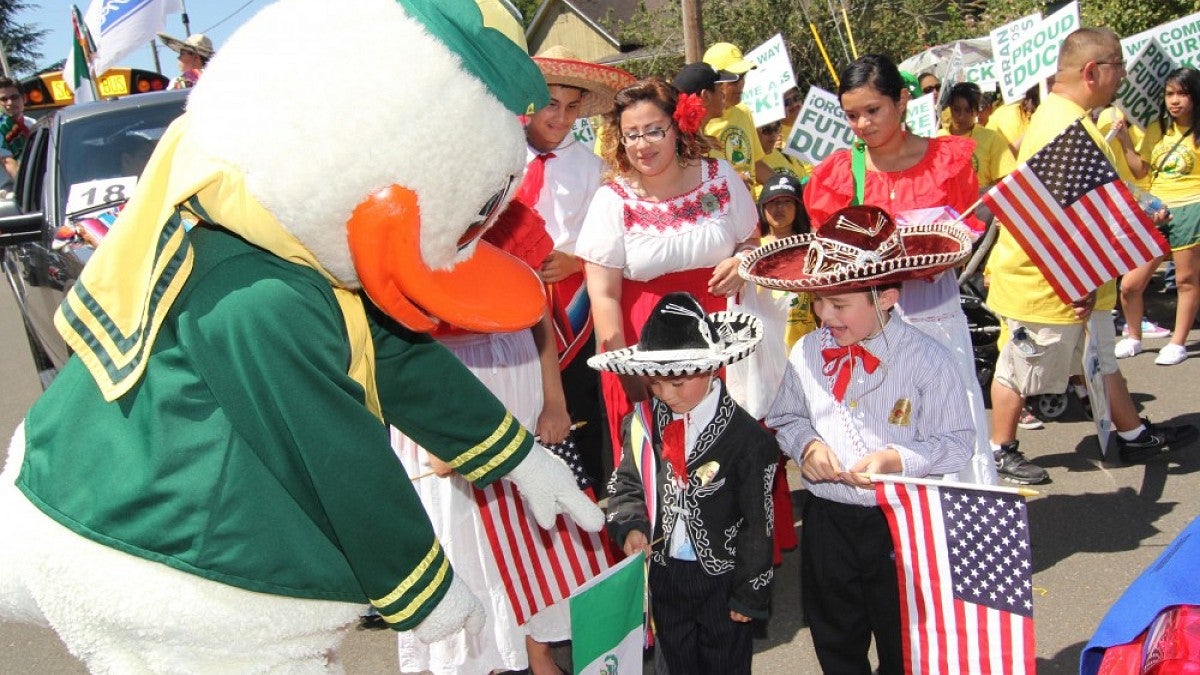With Hispanic Heritage Month in full swing across the nation, several events are taking place around the University of Oregon campus from now until the end of October in celebration and recognition of Latino culture.
The wide-ranging events provide an opportunity for students to immerse themselves in the traditions of Latino culture, to teach others about their way of life and to get involved with diverse student groups on campus.
The schedule of events reflects a universitywide collaboration — from the art and natural history museums on campus to academic departments and student groups — to celebrate the traditions and culture of the thousands of Latinos on campus.
“I’m really excited for all the events this year,” said Romario Bautista, a sophomore journalism student who also serves as the programs coordinator for the UO Movimiento Estudiantil Chicano de Aztlan (in English: The Chicano Student Movement of Aztlan). “It’s a great way for the community, as well as the faculty and students, to get involved and interact with one another. A lot of time goes into these events, but in the end I’m always very happy to see the community together.”
While the month-long observance has been underway for a couple weeks — Hispanic Heritage Month typically lasts from Sept. 15 to Oct. 15 each year — many of the events are scheduled for later this month to accommodate the return of students to campus.
The jam-packed schedule includes open houses for various Latino student groups, artists’ talks and workshops at the Jordan Schnitzer Museum of Art, Spanish language circles, public discussions, high-profile speakers, theater performances and awards celebrations. Although Hispanic Heritage Month typically ends on Oct. 15, the festivities at the UO will keep going throughout the month, ending with a Día de los Muertos celebration during the last weekend of October.
“It really comes down to belonging and connectedness,” said Rosa Chávez, assistant director at the UO Center for Multicultural and Academic Excellence. “It’s about bringing everyone together. I think there’s room for this to grow, to become an institutionalized event — I think we’re heading towards it being more of a university collective.”
Perhaps more than any other event during Hispanic Heritage Month, the “Strengthening Networks of Support for Latino/a Students” — one in a series of Lunes Latin@ events — embodies the spirit and collaboration behind the festivities, Chávez said. The event highlights faculty research projects funded by the Center for Latino/a and Latin American Studies, a cross-campus collaboration emphasizing the supportive network and creative work that faculty and staff are engaged in on behalf of Latino students.
The networking and research presentation is scheduled for Monday, Oct. 26, from 4 to 5:30 p.m. in Room 166 of Lawrence Hall.
“By participating in these programs and events, I hope that our students can reflect on their academic experiences and come away with a vision of their professional development opportunities moving forward,” said Sari Pascoe, the Division of Equity and Inclusion’s assistant vice president for campus and community engagement. “It’s the little things, like these campus events, that promote our students to be who they are and to be proud of who they are.”
Chávez and Pascoe both noted that many of the events of this year’s Hispanic Heritage Month mark a continual increase in the diversity of resources offered to UO faculty and students. Both Chávez and Pascoe don’t remember having a single Latina mentor when they attended college, and while there’s still a ways to go in this area at the UO, they said, students are beginning to receive help, advice and a sense of community from leaders who share their experiences.
“There are small changes that we are beginning to see on campus, where students can see leadership and their heritage reflecting down,” Pascoe said. “We’re making sure there is leadership and decision makers that represent their voices. It’s our responsibility to mobilize these kinds of efforts; it’s a systemic implementation of benefits on behalf of our students so that they can influence the path as our next generation of leaders.”
— By Nathaniel Brown, Public Affairs Communications


